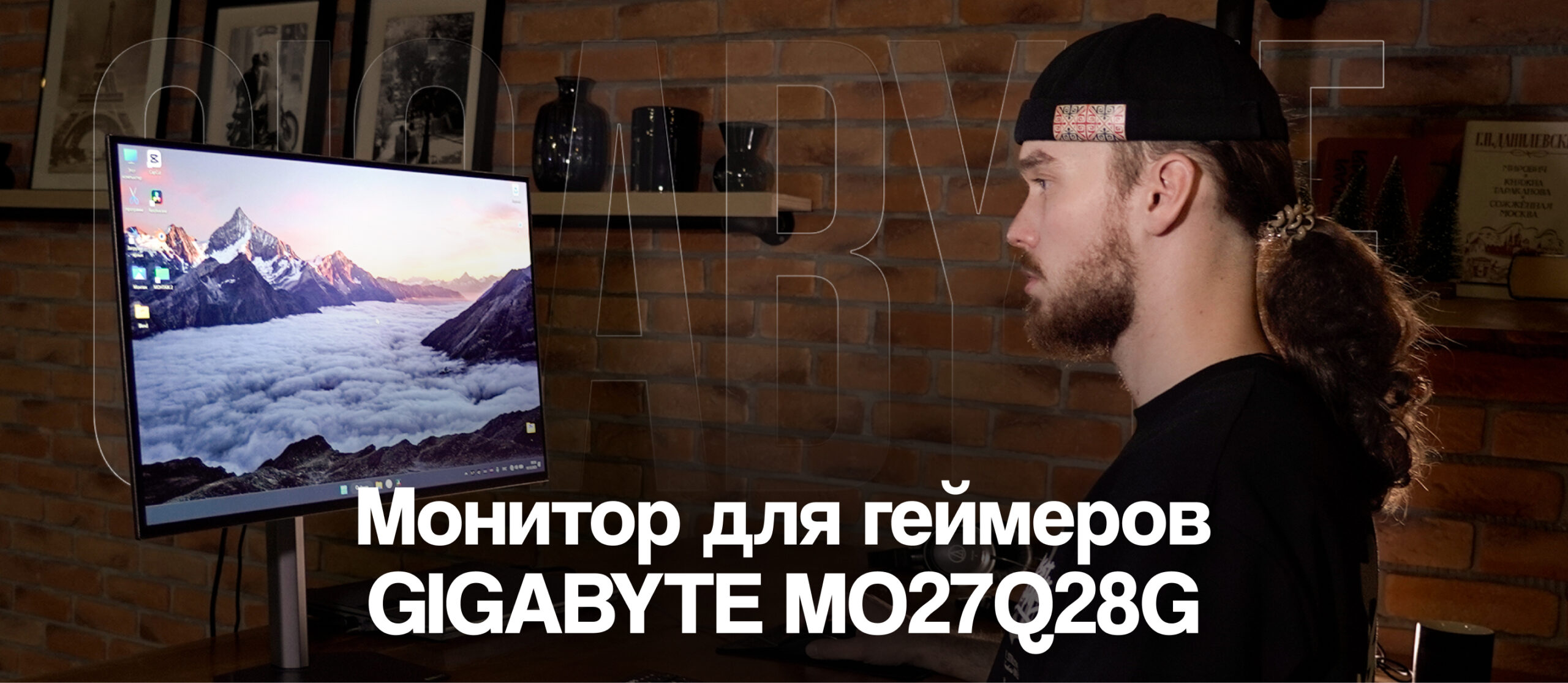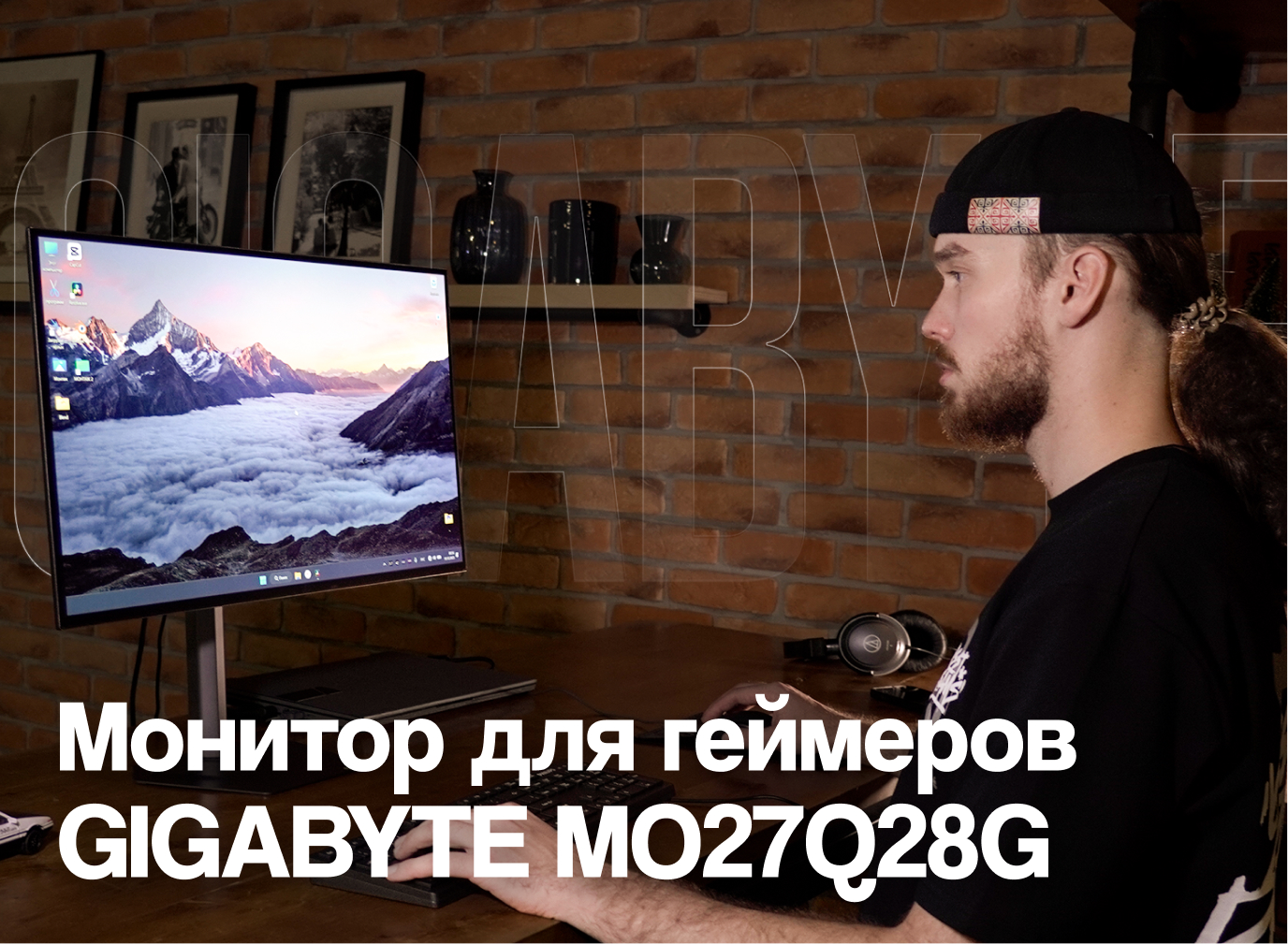Artificial intelligence is steadily integrating into business processes worldwide, transforming industries with its innovative applications. Kazakhstan is no exception, with its companies actively contributing to the global AI landscape. One standout example is the startup AICA, which has developed an AI-powered platform offering transcription, text-to-speech services, and speech analytics tailored for businesses. In a conversation with Er10 Media, Nurlan Zhunosov, co-founder of AICA, shared how the startup is creating a new market, why its services outperform international competitors, and how businesses are embracing these cutting-edge technologies.
Follow Kazakhstan’s Startup Movement in the "100 Startup Stories of Kazakhstan", a collaborative project by ER10 Media and Astana Hub. This initiative highlights the most innovative Kazakh startups, showcasing projects that stand out for their creativity and impact. Among the heroes are Astana Hub residents, as well as creators of other innovative technological products and services. The content is available in Kazakh, Russian, and English.
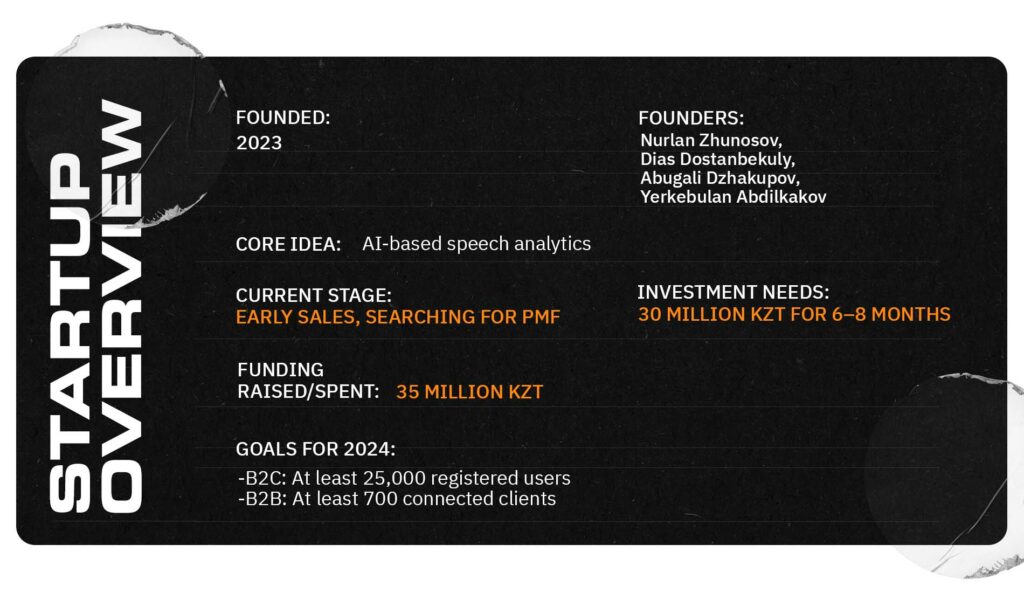
The Journey Toward Entrepreneurship
– How did you transition into entrepreneurship?
– "I worked in various positions for many years, gradually rising from entry-level roles to becoming a board member at a major development company. I started as a manager in a construction company, then became a mid-level manager in a telecom company, overseeing cinema construction projects and developing large-scale initiatives. However, when I reached a top-level position, certain circumstances and insights led me to realize I wanted to pursue my own business.
Balancing a senior executive role in a large company while also trying to build a startup wasn’t feasible. So, I chose my own path. It was challenging to shift my mindset after 20 years of honing my management skills and start thinking like an entrepreneur. Fortunately, I had experience building projects from the ground up. For instance, I developed the CINEMAX cinema chain from conceptual design to construction and launch, positioning it as an industry leader in terms of attendance and revenue.
– Was it difficult to come up with a startup idea?
– Initially, I considered several offline projects—various services and later food retail—but startups and IT businesses always intrigued me. I read extensively on the subject, studied case studies, and watched countless interviews with founders and investors. While working in the food retail sector, we realized the market was largely undigitized, particularly on the customer side, so we decided to create a digital platform.
The food retail market in Kazakhstan exceeds $10 billion annually and appeared highly attractive for a startup. We invested time and effort, but eventually, we understood that the market wasn’t ready for our product concept. We needed to approach the problem differently. Currently, we’re revisiting this idea, breaking it down, and reformulating our hypotheses. Around this time, we joined the Startup Garage program at Astana Hub. While exploring new directions, we took notice of AI tools, particularly speech analytics, and its potential. This led us to pivot, resulting in the creation of the AICA (Artificial Intelligence for Communication Analysis) platform. It offers transcription (Speech-to-Text), text-to-speech (Text-to-Speech), and speech analytics services for businesses.

– Who developed your product? Did you rely on local specialists or involve international experts?
– Our team is entirely local—a small but talented group of young professionals with extensive expertise in IT product development, particularly in AI.
We invested in our own infrastructure, building a server specifically optimized for speech analytics, hosted in a data center to ensure maximum performance and processing speed. Everything is local and rooted in Kazakhstan.
We do plan to expand the team slightly, especially in development and sales.
For Businesses and Consumers
– What are the key features of the AICA platform?
– The AICA platform offers services for two main segments:
For B2C – Audio-to-text transcription and text-to-speech services.
This convenient tool allows users to quickly convert audio recordings, calls, interviews, and meetings into highly accurate text formats. Regardless of the topic or language, you can instantly obtain text for further analysis, editing, or documentation. The text-to-speech service transforms textual data into professional audio in Kazakh, Russian, English, and Uzbek, with options to choose various voices and adjust intonation settings. This service is ideal for creating educational materials, advertisements, and social media content.
For B2B – AICA Speech Analytics.
This comprehensive tool helps analyze and enhance customer communications by automatically processing calls and conversations to identify key interaction metrics. The service evaluates script adherence, service quality, additional sales opportunities, and detects telephone fraud, providing a complete picture of client interactions. It enables companies to monitor employee performance, understand customer needs, and make informed decisions to improve efficiency and increase sales.
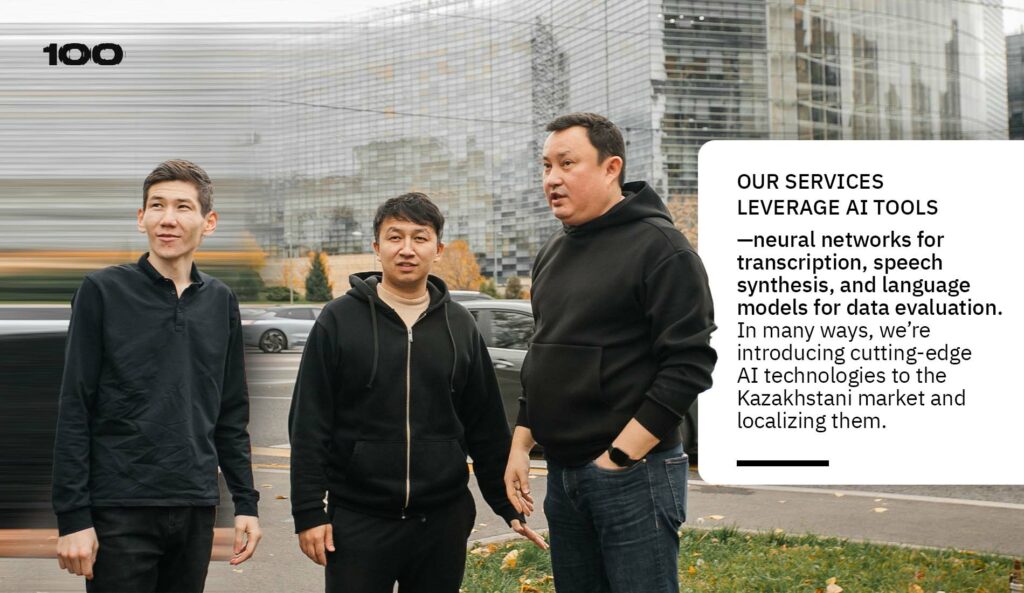
– Was it difficult to identify the market pain points?
– Let’s look at this question from the perspective of market depth and trends.
Our services leverage AI tools—neural networks for transcription, speech synthesis, and language models for data evaluation. In many ways, we’re introducing cutting-edge AI technologies to the Kazakhstani market and localizing them.
Take, for example, audio-to-text transcription and text-to-speech. Currently, there are over 100,000 monthly search queries for these services in Kazakhstan. However, these demands are only partially met, especially for the Kazakh language, where there are virtually no high-quality services available. While this market is still forming, users are already using our platform to transcribe voice messages, meeting recordings, audio lectures and seminars, YouTube content, team communications, and employee calls for quality assurance. There have even been requests to transcribe court hearing recordings, though such tasks require official documentation that falls outside our scope.
For instance, we received a request for an educational project requiring transcription of over 120,000 minutes of content. As for the text-to-speech service, it’s used to create advertising content, informational materials, and educational resources. While the service is still a work in progress, it currently supports multiple languages—Kazakh, Russian, English, and Uzbek—with a variety of customization options. We are continuously working on developing additional voices and improving the user experience.

However, the business speech analytics market is something we need to build from the ground up. We are among the first in Kazakhstan to work in this field. While there might be similar projects, we are not aware of any direct competitors. This is a vast sector that we are actively exploring, studying, testing, and making our first sales. Currently, our biggest challenge is determining which segment offers the greatest potential for growth and focus. For example, we’ve received a partnership inquiry from a Kazakhstani video analytics company managing tens of thousands of cameras. A fascinating synergy could emerge, as speech analytics has the potential to significantly enhance their service and address client needs. We’ve also received inquiries from medical centers interested in analyzing client calls.
– What stage is the startup currently at?
– In the B2C segment, we’ve tested hypotheses, gained insights into user behavior, and are now working on a strategy to become the #1 transcription and text-to-speech service for Kazakhstani users. We’ve studied neighboring markets and launched our services in test mode a month ago, with over 1,200 registered users so far. While testing various functionalities, redesigning the front-end, and validating hypotheses for better conversion rates, we’ve developed a new front-end design aimed at providing a superior user experience. This updated version, complete with finalized features, is ready for release.By the end of the year, we aim to have at least 5,000 registered users. Over the next six months, we plan to launch our services in Uzbekistan and Kyrgyzstan, targeting a combined audience of 65 million people.
In the B2B segment, we are testing hypotheses and seeking product-market fit (PMF). There’s still significant internal work to be done to confidently enter the market with a polished product. Additionally, we were selected for Astana Hub’s Sales Bootcamp program, which focuses on boosting sales and revenue growth. Last week, we attended an introductory session where we were introduced to a strong network of experts and trackers. We plan to make the most of this opportunity to achieve solid sales and traction.
Focus – the Kazakhstani Market
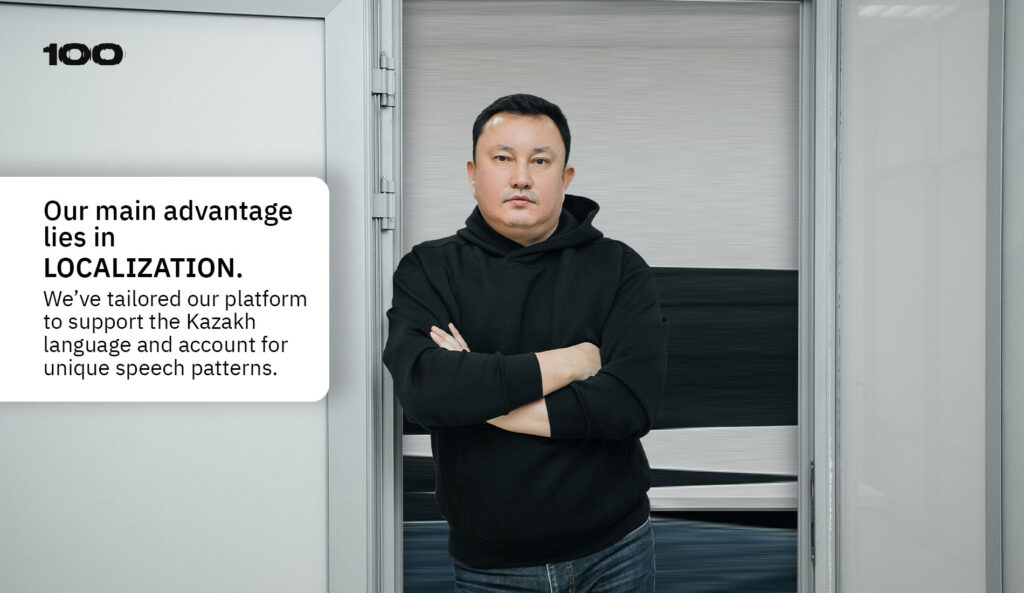
– Do you have many competitors? What sets you apart?
– In the B2C segment, our competitors are primarily Russian and international services. Our main advantage lies in localization. We’ve tailored our platform to support the Kazakh language and account for unique speech patterns. When conversations include two languages, slang, and regional dialects, providing accurate services becomes much more complex. Additionally, there are very few open resources in Kazakhstan for training and testing AI models. Being closer to the user gives us a significant edge in understanding and addressing their specific needs.
In the B2B segment, competition is virtually nonexistent since this market is still emerging. Some indirect competitors rely on basic GPT-based solutions that lack technological depth or significant investment. Our solution stands out because it can connect both offline touchpoints, such as in-store interactions at checkout counters, and online communications like call recordings and archived conversations. For example, we’ve developed a speech analytics service for pharmacies and pharmacy chains to analyze checkout communications. Similarly, we’ve created solutions for medical centers and retail companies, enabling them to analyze customer calls, schedule appointments, and process orders.
Up to 95% of customer interactions go unanalyzed. This means a massive amount of valuable data contained in these conversations is simply wasted.
Our platform evaluates communications for service quality, customer inquiries, demand insights, conflict situations, fraud detection, upselling opportunities, script adherence, and more.
– What level of investment does your startup need?
– Over the next 6–8 months, we require approximately 30 million KZT to drive growth, enhance sales, and improve our technology and product offerings. This funding will also allow us to expand the team and implement the plans we’ve already outlined.
Are we living in 2080?
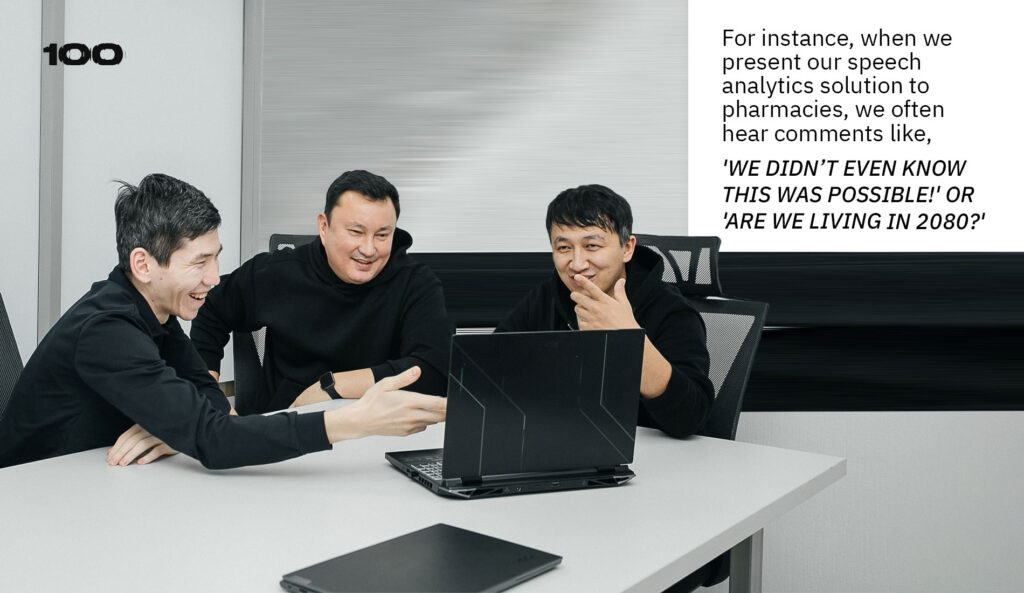
– Is it challenging to develop a startup? Are there hidden obstacles slowing you down?
– The primary challenge is that our products and services are entirely new and unfamiliar to the market. For instance, when we present our speech analytics solution to pharmacies, we often hear comments like, 'We didn’t even know this was possible!' or 'Are we living in 2080?' This reaction reflects the difficulty in conveying the product’s value to businesses that are unfamiliar with such innovations. Users of transcription and text-to-speech services find it easier to adopt our solutions because they’ve likely encountered similar AI technologies in news or media. Some have even tested comparable tools.
However, speech analytics is a more complex product, which makes it harder to sell. But this is a common pattern with all innovative technologies. Think back to when retail automation was first introduced—it was met with resistance. At the time, businesses managed inventory manually, jotting prices on product tags. Today, retail automation is indispensable, and we believe speech analytics will follow the same trajectory.
– What are your plans for the future? Will you continue improving the product?
– Our first priority is to achieve PMF (Product-Market Fit) for speech analytics while refining our technology and enhancing the product.
Our goals for the next 6–8 months include: Reaching 15,000 users for transcription and text-to-speech services and onboarding at least 500 B2B clients for speech analytics. Recently, we began negotiations with a large pharmacy chain operating 300 locations. They’ve shown interest in our services, and we plan to continue discussions to implement AICA in 2025. Additionally, we’ve sent materials to a shareholder of another major pharmacy chain with 130 outlets. Looking ahead, we’re exploring opportunities to enter markets significantly larger than Kazakhstan’s. Expanding regionally and internationally is part of our long-term vision.
– Do you plan to scale globally and become a unicorn?
– For now, our primary focus is achieving local success, step by step. However, like most founders, we aspire to create an international unicorn in the future. The ambition is there, but it’s essential to build a strong foundation first.
AI Will Enter Every Aspect of Life
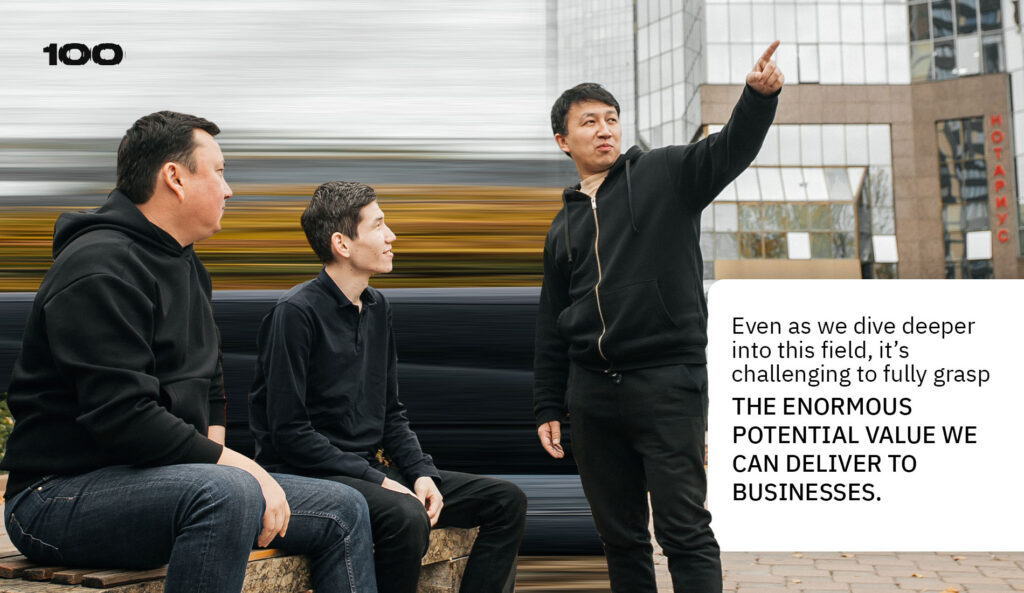
– Will speech analytics have a significant impact?
– Even as we dive deeper into this field, it’s challenging to fully grasp the enormous potential value we can deliver to businesses. Consider the vast number of recorded conversations stored in CRM systems, virtual PBXs, and archival folders across industries—from banks to dental clinics, service companies to e-commerce platforms. Add to that the daily volume of offline customer interactions happening in Kazakhstan, most of which remain unanalyzed.
Our platform has the ability to transcribe and analyze each conversation, evaluate employee performance, gather data on customer needs, assess service quality, detect fraud, and provide actionable insights. The opportunities are immense.
– Your startup operates at the cutting edge of technology. What’s next for AI development?
– The AI sector is currently on a high. It’s one of the fastest-evolving and most groundbreaking technologies. Our goal is to position ourselves among the top AI companies in Kazakhstan. The direction is already clear—AI will integrate into all aspects of our lives and business processes. In Kazakhstan, the most obvious areas for AI adoption include healthcare, education, services and government interactions, sales and e-commerce, finance, and security.
– Is Kazakhstan a supportive environment for startups?
– A lot has been accomplished, but there’s still much work to do. It’s a well-established fact that the startup movement in Kazakhstan is growing rapidly.
Just look at the number of startup events and meetups held this year, the variety of development programs available, and the initiatives planned and implemented by the government. So many successful startup stories have already been written.
That said, key players in the market are emphasizing the need to develop the venture capital ecosystem in Kazakhstan and the region, involve strategic investors, and establish fund-of-funds to attract global investments.
"It’s a Shame I Didn’t Start at 30"

– Do you enjoy being an entrepreneur? Is it harder than being an employee?
– Absolutely! In my view, a true entrepreneur is someone who has already built a business, navigated challenges with their projects, established a client base, and achieved profitability. Right now, we’re still in the romantic phase of our startup journey. There’s much ahead of us—from validating our business model to conquering the market.
Is it harder? Not necessarily, but it’s certainly more about responsibility. I have experience building departments, project and operational teams, and managing large-scale initiatives. But even as a top manager, with responsibility for an entire department, team, or project—and even holding some equity in the company—you’re still operating under the umbrella of the primary shareholder, who takes on the main risks. An employee, no matter how senior, is ultimately 'under the protection' of their leader, shareholder, or owner.
– What inspires you in your work?
– Time. It’s ticking, and there’s so little of it. I can’t help but feel regret that I didn’t start working on startups when I was 30.
– Do you have any favorite books?
– I’ve read a lot, but I wouldn’t say I have any favorites at the moment. These days, I focus more on analytics, specialized materials, research, and interviews.

– What sport best represents your character?
– That’s a tough question. I enjoy skiing and hiking. Overall, I love the mountains.
– What is your startup’s main mission and your ultimate dream?
– Our mission is to create value—to develop useful products and services that help people save time, work more efficiently, learn better, create, and fulfill their potential. We’re passionate about making a positive impact and increasing the efficiency of business processes. This can mean improving traditional industries or creating entirely new ones.



